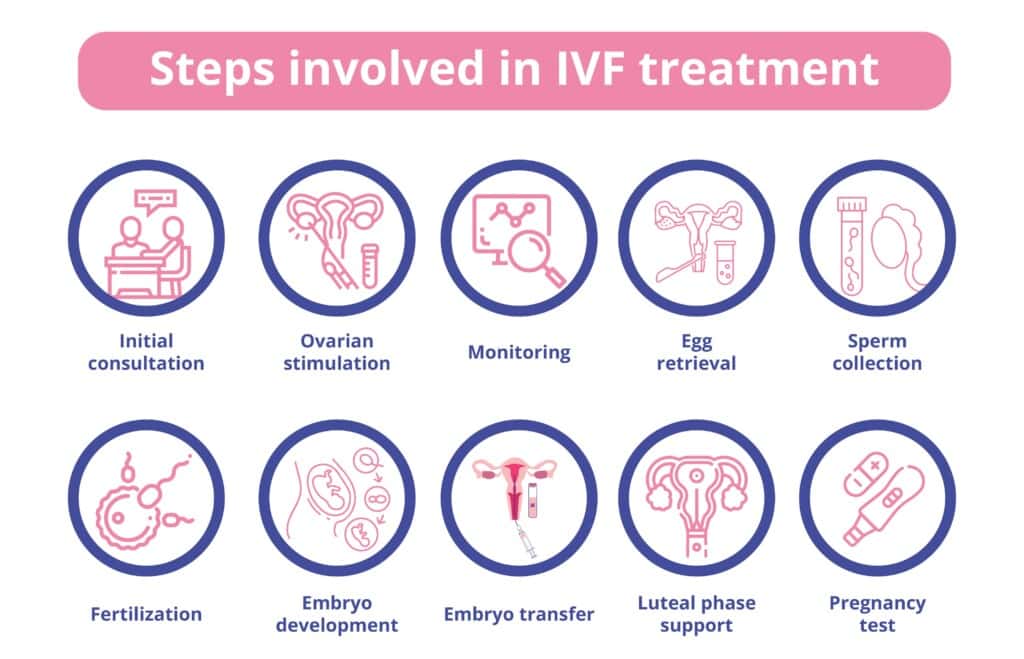Embarking on the journey of In Vitro Fertilization (IVF) can be both exciting and overwhelming. Proper preparation is key to enhancing your chances of success and ensuring a smooth process. Here are the top 10 tips for preparing for IVF, brought to you by Ferty Nest.
1. Understand the IVF Process
Educate Yourself: Before starting IVF, it's crucial to have a thorough understanding of the process. IVF involves multiple stages, including ovarian stimulation, egg retrieval, fertilization, and embryo transfer. Familiarize yourself with each step to reduce anxiety and increase your preparedness.
Consult Reliable Sources: Consult reliable sources and medical professionals to get accurate information. Attend informational sessions provided by your clinic and read reputable articles and books on IVF.
2. Choose the Right Clinic
Research and Reviews: Selecting the right fertility clinic is vital. Look for Fertility clinics with high success rates, experienced doctors, and positive patient reviews. Ferty Nest, known for its state-of-the-art technology and compassionate care, is an excellent choice for many.
Visit and Ask Questions: Schedule visits to potential clinics to see their facilities and meet the staff. Prepare a list of questions regarding their procedures, success rates, and patient care to help make an informed decision.

3. Financial Planning
Cost Awareness: IVF can be expensive, so it’s important to understand the costs involved, including medications, procedures, and additional treatments. Some clinics, like Ferty Nest, offer financing options and payment plans.
Insurance and Savings: Check if your insurance covers any part of the IVF process. Additionally, consider starting a savings plan early or exploring financial assistance programs.
4. Optimize Your Health
Healthy Diet: A balanced diet rich in vitamins, minerals, and antioxidants can improve fertility. Focus on consuming fresh fruits, vegetables, whole grains, lean proteins, and healthy fats. Avoid processed foods and excessive sugar.
Regular Exercise: Maintain a regular exercise routine to keep your body fit and healthy. However, avoid strenuous activities that can affect ovulation and implantation. Aim for moderate exercises like walking, yoga, or swimming.
5. Manage Stress
Stress Reduction Techniques: High stress levels can negatively impact fertility. Practice stress-reducing techniques such as mindfulness, meditation, deep breathing exercises, and yoga. Consider counseling or support groups to manage emotional stress.
Relaxation and Leisure: Incorporate leisure activities and hobbies into your routine to relax and unwind. Reading, gardening, or enjoying time with loved ones can help maintain a positive mindset.
6. Quit Unhealthy Habits
Avoid Smoking and Alcohol: Smoking and excessive alcohol consumption can significantly reduce fertility. Quit smoking and limit alcohol intake to enhance your chances of IVF success.
Limit Caffeine: High caffeine consumption can negatively affect fertility. Reduce your intake to one or two cups of coffee per day or switch to decaffeinated options.
7. Take Necessary Supplements
Prenatal Vitamins: Start taking prenatal vitamins with folic acid at least three months before starting IVF. Folic acid helps prevent neural tube defects and supports overall reproductive health.
Consult Your Doctor: Consult your doctor before taking any supplements to ensure they are safe and beneficial for your specific needs.
8. Follow Medication Protocols
Adherence to Prescriptions: Strictly follow the medication protocols prescribed by your fertility specialist. Proper medication is crucial for stimulating the ovaries and preparing your body for IVF.
Set Reminders: Use alarms or reminders to ensure timely medication intake. Missing doses can affect the treatment’s effectiveness.
9. Prepare Emotionally
Set Realistic Expectations: Understand that IVF is a process, and success may not happen on the first try. Setting realistic expectations can help manage emotional ups and downs.
Support System: Build a strong support system with your partner, family, and friends. Emotional support can make the IVF journey more manageable.
10. Plan for the Procedure
Time Off: Plan for time off work around key stages of the IVF process, such as egg retrieval and embryo transfer. Rest and relaxation are important during these times.
Logistics: Arrange for transportation and any necessary accommodations near your clinic, especially if it’s far from home. Being close to the clinic can reduce stress during appointments and procedures.
Conclusion
Preparation is crucial for a successful IVF journey. By understanding the process, choosing the right clinic, optimizing health, managing stress, and following medical advice, you can enhance your chances of success. Ferty Nest is committed to providing exceptional care and support to help you achieve your dream of parenthood. Start your IVF journey with confidence, knowing that you are well-prepared and in good hands.

